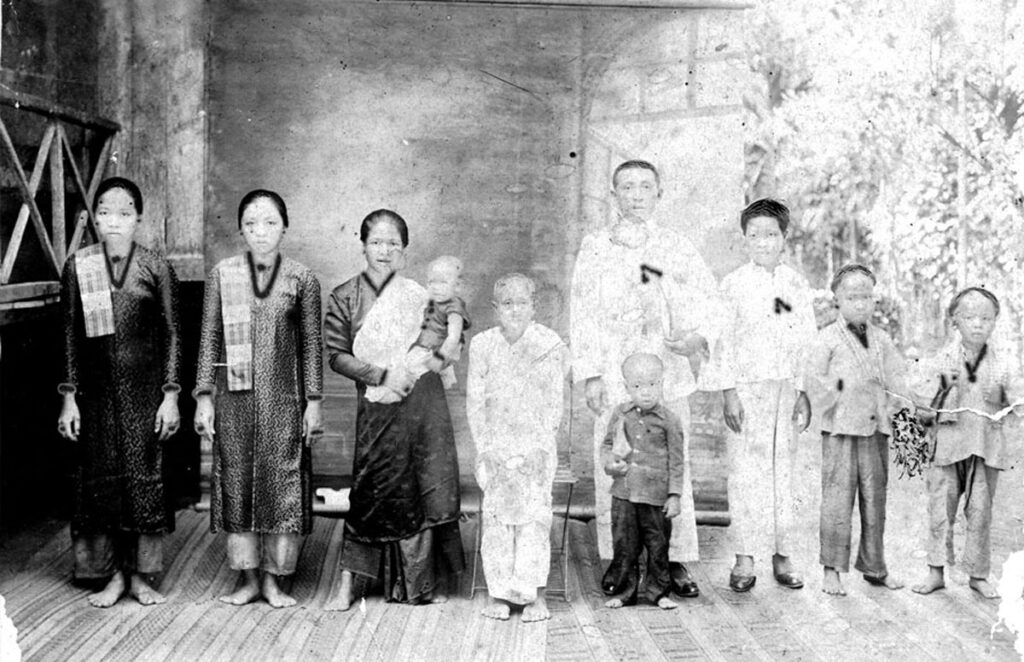I was very lucky to have survived the Khmer Rouge regime. My mother and five of the eight children in our family died, but I lived by lying to the Angkar, saying I was a cyclo [pedicab] driver.
My original name was Meng Chheng. It is a Chinese name, which made finding work very difficult. So, before the Lon Nol regime, I changed my name to Kea Sothy instead.
After I married Taing Sophany in 1970, we lived near Pochentong Airport west of Phnom Penh. My older brother Chhun and I began working at the airport in 1971. I was a controller, keeping track of all the people and products coming in and out. In my spare time, I studied French so it would be easier for me to communicate with the pilots, who were mostly Laotians.
In 1973, it became too dangerous in Cambodia for most people to travel on the roads or rivers. Many of the roads were bombed and there were battles along both the roads and rivers. So, if people could afford it, they flew. Often 35 to 60 people would be on flights to the provinces.
On the morning of April 17, 1975, I flew to Kampong Chhnang Province to check on some goods that were being sent to Phnom Penh. However, when we tried to return, the plane was not allowed to take off. The Laotian pilots said they were going back to Laos and asked me to come with them. However, I declined to go; I wanted to go back to my home town in Kandal Province. I had known for some time that the country was unstable and had already discussed this with my wife.
Sophany was evacuated before me; she carried our son most of the way, but he died of heat and starvation before she reached our home village. It took me another month to meet up with her, but shortly after I arrived, the Angkar moved us to Battambang Province. When they asked me about my biography, I told them I drove a cyclo.
We were put into a cooperative in Battambang. The base people there did not work as hard as the new people. They also had a larger portion of food, and were allowed to keep rice in their homes. The local people ate rice most of the time, while the new people ate it only on special occasions; otherwise, we ate rice soup. We also lived apart from our families, and I was not allowed to see my wife very often.
The cooperative chief En was cruel. Sometimes he took the villagers’ daughters and raped them. I saw En rape a young woman and then kill her. He also sometimes cut people open, removed their livers, and cooked them to eat. Whenever he did this, his eyes became very red.
My older brother Kea Chhun had the highest position of the children in my family. He was very smart and could speak many languages. He also studied in Germany, America, France, Australia, and Bulgaria. Chhun was the manager of the airport. He helped me to get a job there and my younger brother Kea Meng Leang to get work at a private travel agency. He also helped two of my sisters to become air hostesses. Chhun had a big villa in Phnom Penh.
When the Khmer Rouge evacuated people from the city, Chhun went to his wife’s home town in Kandal Province. He had put all of his belongings in a car, but had to abandon it when he came to a flooded area. Chhun, his wife, and their five children lived just across the river from our family at first, but then he was also evacuated to Battambang.
There, a man who used to work with Chhun told the Angakar that he had been a colonel at the airport. My brother was already tired of the lack of food, so when he heard about this, he decided to run away. The first time he tried, he got lost in the jungle. The Angkar caught him and said, “Don’t you ever run again. If you do not have enough to eat, just let the Angkar know.” When he ran away the second time, he got caught again. The cadres punished him by ordering him to carry enough water to fill a huge jar in one day. Chhun could not complete the task because he was exhausted and starving. The cadres killed him nearby that big jar. They also caught his wife, who had stolen some rice from the cooperative kitchen, and killed her.
After this, in 1978, my mother and one of my older brothers died of starvation.
In January, 1979 our unit chief called all the villagers to a meeting. He said, “Our country will be peaceful very soon; please do not mind that I cannot stay with you because I have to move away.” A few days later there was heavy gunfire and cars full of Khmer Rouge cadres sped through the jungle. I had hidden a radio in a tree and took it out. They said that Cambodia would be liberated soon.
Then my wife and I started back to Phnom Penh. Of my siblings, only two of my sisters and I had survived. Later, I learned that three of Chhun’s children were still alive. I found them and have been looking after them ever since.

